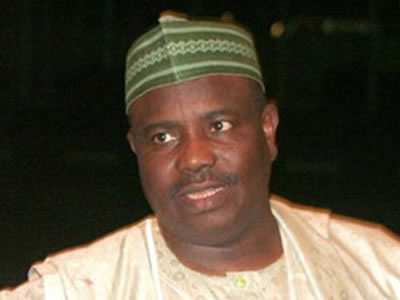By Abba Dabo
In his vote of thanks at the presentation, of the 2013 Budget by President Goodluck Jonathan, on Wednesday, October 10, 2012, the Speaker of the House of Representatives, Aminu Tambuwal, veered, significantly, away from the normal courtesy of acknowledging and expressing gratitude to the President, for his rare visit to the National Assembly, to a criticism of aspects of President Jonathan’s administration. In a breach of protocol, the Speaker, essentially, used the opportunity of a “vote of thanks” to harangue the President. This should not have happened. While he has every right to express his views or those of the House of Representatives on the Executive, it cannot be right that he chose to do so at a forum in which the President was a guest and had no right to reply. The President was turned into a captive and, must have been embarrassed by the gross abuse of protocol. The point Mr Speaker made should have been made on the floor of the House after their Guest should have taken his leave – not when he was seated there as a Guest of the National Assembly with no right to reply.
The Speaker was, of course, anxious to raise issues which he described as ‘salient points of critical importance [to] good governance’. These include the disregard of National Assembly resolutions, the level of budget implementation and the non-adoption of crude oil benchmark preferred by the House of Representatives. The Speaker expressed concern that the resolution of the National Assembly are ‘increasingly disregarded’ by the Executive. And in an ominous tone, he warned about the consequences for Executive-Legislature relations and the stability of the polity. Serious as this concern may be, it seems to have been informed by a wrong perception of the status of the resolutions of the National Assembly. It is apparent that the National Assembly is, increasingly attaching, to its resolutions, the compulsion that is, normally, associated with a law or the constitution.
If the resolutions of the National Assembly were expected to have the force of a law, the framers of the constitution would have said so. Indeed, there would have been no need for resolutions; only laws. The truth is that ‘resolutions’ are advisory and they require some amount of consultation and compromises with the Executive arm of government if they are to be of any effect. They cannot be expected, to be implemented, willy nilly. The moment that happens, the separation of powers would have been, fatally, blurred. The National Assembly, rather than moan over disregard of its resolutions, should fashion out new strategies for working, with the Executive, to give effect to those desires which are conveyed in these resolution.
The Speaker re-iterated the well-advertised position of the House of Representatives that the implementation of the 2012 Budget is far below expectation. Indeed, basing his assessment on ‘interim oversight reports from House Committees’, the Speaker described the implementation level as being ‘unimpressive both in terms of releases as well as utilisation’. This assessment represents an unwillingness to shift positions and alter perceptions in response to contrary information. As the Federal Minister of Finance has said repeatedly, budget implementation was at the level of 56%, at the time the House first raised its alarm in July, 2012. That figure should have gone up, significantly, since another quarter of releases has elapsed. More significant is that there are still six months before the life of the 2012 Budget expires in March 2013. This is a long enough time for a substantial jump in implementation. It is important to note that the 2012 Budget came into force in April 2012, which means that, at the time of the Speaker’s remarks, the Budget was, effectively, only in its sixth month; really not time enough for a fair appraisal of a budget, with a life-span of twelve months.
Another of the ‘salient points’ was the difference between the $75/Barrel benchmark adopted by the Federal Government in the 2013 Budget and the $80/Barrel preferred by the Speaker. He claims that the difference of $5 would have been ‘channelled exclusively towards reducing the deficit in the budget and, consequently, reducing the domestic borrowing by 66%’. It is not clear what he hoped to achieve by making this point. The hard fact is that it is the prerogative of the Executive to make a determination on this matter and, as President Jonathan said, in his budget speech, the choice of a benchmark for the 2013 Budget was based on a ‘well-established econometric methodology’.
Whatever the merit of the points raised in the Speaker’s vote of thanks, they were vitiated by the inappropriateness of the forum in which they were made. It would, indeed, be in the interest, of all, if the vote of thanks, at such occasions in the future, is limited to what it is intended to be while speeches and memoranda, about governance, are reserved for more auspicious occasions.
It is also important to say that the Speaker and majority of members of the National Assembly were elected on the same political platform as the President and Vice President. They all have a common obligation to work for the good of the country, in line with the Manifesto of the Peoples Democratic Party. While it cannot be decreed that they should always agree on issues, their differences must always be managed with deference to their common platform and without damaging the image of the party to which they all belong.
Abba Dabo
State House
Abuja



